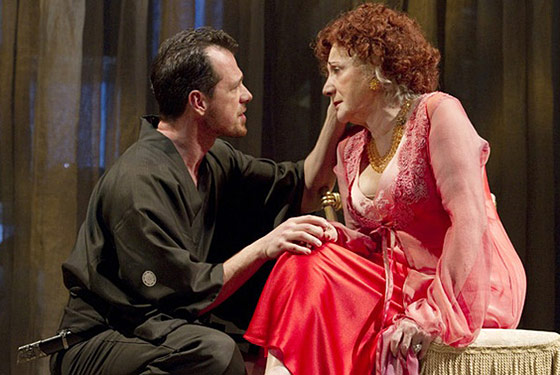
If it’s laughs we’re after, our culture can’t resist a randy old dowager. We’re less keen to watch one die, especially if we’ve spent the last two hours chuckling at her expense. Yet this is the chief errand of Tennessee Williams’s 1963 oddity The Milk Train Doesn’t Stop Here Anymore, and the mammoth task assigned to its latest leading lady, Olympia Dukakis. Playing the terminally ill socialite-plutocrat Flora Goforth, Dukakis (a sprightly 79) tacks carefully between comedy and catastrophe, ghostly poetry and morbid camp.
That Dukakis doesn’t consistently succeed has less to do with her powers of interpretation and more with the rich — sometimes too rich — strangeness of the text. (That said, I suspect her cotton-mouthed accent will divide audiences; personally, it grew on me.) Directed (and, to a certain extent, reconstructed) by Michael Wilson (The Orphan’s Home Cycle), Milk Train is an oddity. It was written in the early sixties, during the excruciating final days of Williams’s longtime lover Frank Merlo. The playwright had just enjoyed what would prove his last great critical and commercial success, Night of the Iguana, a play that bears several superficial similarities to Milk Train: a windswept promontory in a foreign land, a miasma of American hegemony, a lonely, still-libidinous older woman and a younger, off-course male redeemer/consort with spiritual pretensions that might actually be sincere. (Here, his name is Christopher Flanders, a wandering artist-gigolo who’s in the habit of “comforting” wealthy older ladies as they approach the grave: The Collection’s Darren Pettie has the stones to play this more-than-faintly ridiculous character completely straight, his stud’s entitlement shifting tactically into Zen submission.)
Milk Train had the dubious distinction of bombing twice on Broadway, in two separate, back-to-back productions, the latter starring Tallulah Bankhead (herself less than five years from death). Williams rewrote it massively between openings, tricking out the second incarnation with lots of self-conscious folderol: Kabuki-inspired “stage assistants,” lectures to the audience about the stagecraft, etc. With access to early drafts provided by Williams’s estate, Wilson (who originated this production two years ago at Hartford Stage) has stripped most of this clumsy, desperate stuff away, and good riddance — reading it off the page, it seems added in a panic.
The play is not, at heart, an experimental work, just a messy one, chiefly informed by Williams’s deepening sense of (and attraction to) the grotesque. Goforth (seriously, the names in this thing … ) is written as an American monster of capitalism, fame and appetite, a direct relative of Big Daddy from Cat on a Hot Tin Roof — though far more broadly self-parodic, in the execution. Even off-stage, her increasingly unearthly croak is heard over loudspeakers, as she dictates her scandalous, out-of-sequence memoirs to an overworked amanuensis, Frances “Blackie” Black (Maggie Lacey, slightly miscast and struggling mightily with a jaggedly written role that seems to dissolve faster the harder she clutches at it). Dukakis, I think, benefits from being a bit wrong for the part. She never reads as a woman with the past she claims to have: that of a hungry, willful chorus girl plucked from the line by a wealthy gentleman, who had no idea what he was getting himself into. Goforth, as written, hits notes of of Norma Desmond and Anna Nicole Smith; Dukakis is best known for weary wisdom and tart self-awareness, and she always seems a bit more conscious of Flora’s follies than Flora is. But she uses that distance to get her laughs, time and again. In her hands, Goforth’s hideous Kabuki performance is as indelible as it is humiliating.
Milk Train actually seems structured as a loose pageant of embarrassments. Flora is imperial in her wrath and her favor, and is punished accordingly. The play is a work of towering cruelty with a rickety back-stair of grace. (Grace, such as it is, finally arrives in the form of looting, forced divestiture: The monster’s bones are symbolically stripped clean, as the ultimate “Death Tax” is levied.) The strongest principle character is also its smallest: the Witch of Capri, played by the always-miraculous Edward Hibbert, who seems to understand the show’s gothic buffoonery better than anyone. In a role written for a woman (but played by Noel Coward in the atrocious 1968 film adaptation Boom!), Hibbert gives us a kind of aging vampire, a jet-setting parasite with an enormous collection of bogus, purchased titles, a venomous tongue and a leathery heart that pumps “the blood of anonymous blood donors.” The Witch is the World, in all its heartless expediency and endless plunder, and when he faces off with Goforth, the play’s real thrills kick in: We’re in biting distance of an epically overwritten scene from True Blood. There’s something lurid, almost schlocky here, and when Dukakis locks into it, she’s a dark-comic wonder.
The Milk Train Doesn’t Stop Here Anymore is at the Roundabout Theater, 111 West 46th Street, through April 3, 2011.




